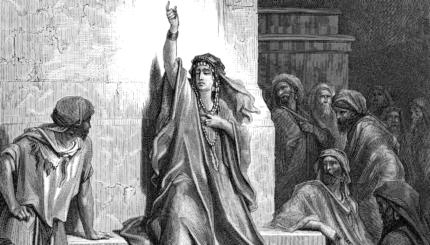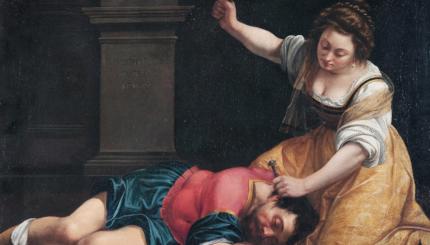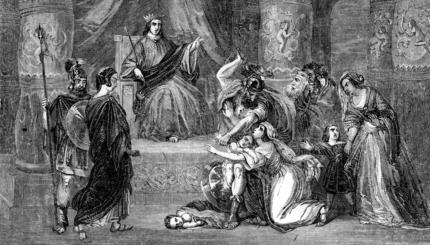Samson is the biblical Hercules, a man of super-human strength who nonetheless could not escape tragedy. Samson’s story is found in the Book of Judges chapters 13-16. He is the last of the major judges who led the Israelites, but he is hardly an ideal role model or savior. Samson breaks vows, marries outside of the people of Israel twice, and functions more as a vigilante than a leader.
Samson’s Birth
The details of Samson’s birth already signify him as a mythical figure. Chapter 13 of Judges tells the story of Manoah and his wife, who is barren. One day, an angel of God appears to Manoah’s wife promising that she will bear a son. But this comes with a warning: She cannot contaminate her body with any alcohol, because her child will be a nazirite — dedicated to God from birth. She also learns that her son will save the Israelites from the Philistines.
Samson’s destiny, and his connection to the Philistines, is explicitly laid out by God even before he is born. The idea of God granting a child in order to dedicate that child to save the Israelites foreshadows a famous birth that appears in the first book of Samuel. There, the prophet Samuel is born to a previously barren woman, and he is dedicated from a young age to serve in the Temple. (Samuel I, 1)
Samson’s Life
Samson’s story skips from his birth to his adulthood, where his first distinguishing act is to ask his father to bring him a certain Philistine woman to be his wife. Samson’s parents object, asking him to find a woman among the Israelites. But the text justifies Samson’s choice, explaining that by marrying a Philistine woman Samson would have opportunities to infiltrate and fight the Philistines, who were the current oppressors of the Israelites.
With your help, My Jewish Learning can provide endless opportunities for learning, connection and discovery.
In fact, it is on his way to claim this non-Israelite bride that Samson first discovers his super-human strength: “Suddenly a young lion roared at him. The spirit of the Lord rushed on him, and he tore the lion apart barehanded” (Judges 14:5-6). Shortly thereafter he uses this strength to kill 30 Philistine men in a fit of rage, fulfilling the angel’s prophecy from the previous chapter(Judges 14:19). This first act against the Philistines exemplifies Samson’s revenge-based vigilantism.
The most famous of all of Samson’s attacks against the Philistines comes in chapter 15. The Philistines raid a town in Judah in order to lure and capture Samson. To save themselves, the Judeans tie up Samson to deliver him to the enemy. But this episode does not end well for the Philistines:
The Philistines came shouting to meet [Samson]; and the spirit of the Lord rushed on him, and the ropes that were on his arms became like flax that has caught fire, and his bonds melted off his hands. Then he found a fresh jaw-bone of a donkey, reached down and took it, and with it he killed a thousand men. (Judges 15:14-15)
Again, Samson leads no army, but acts entirely on his own, fueled by his super-human ability.
In spite of his continued directive from God to fight the Philistines, Samson pursues a much more personal connection with them. He falls in love with a second Philistine woman–the notorious Delilah, who has been tasked by her people to find the secret of Samson’s strength.
Three times she begs to know the secret of his strength, and three times he lies to her. Finally, after Delilah nags persistently, he confesses: “A razor has never come to my head; for I have been a nazirite to God from my mother’s womb. If my head were shaved, then my strength would leave me” (Judges 16:17).
Sure enough, Delilah takes advantage of this new information, lulling Samson to sleep and shaving off his hair. He immediately weakens, and God’s power leaves him. Delilah hands Samson over to the Philistines, who gouge out his eyes, and force him to grind at a mill in prison.
Samson’s Death
Samson’s death ends up being his greatest victory against the Philistines. The Philistines bring Samson down to Gaza and bind him to two pillars in their temple as a display for the amusement of the Philistine worshipers. Here Samson prays to God, asking for his strength to return to him one more time (Judges 16:28).
God responds by sending Samson a final burst of strength, and Samson pushes against the pillars and brings the entire temple down, killing himself and all those in the temple with him. The text concludes: “Those he killed at his death were more than those he had killed during his life” (Judges 16:30).
Samson in Jewish Tradition
The Talmud debates the true character of Samson. One mishnah paints him in a negative light, saying that Samson’s eyes were gouged out as punishment for having followed the desires of his eyes (Sotah 9B).
In its discussion of this mishnah, the Talmud questions how Samson could be punished when God was behind all of his actions in the first place. In the end, the Talmud tries to find a middle ground: that Samson may have followed his own inclinations, but the master plan was God’s. His motivations may have been questionable, but Samson was still an important hero at a troubled time for the Israelites.
Talmud
Pronounced: TALL-mud, Origin: Hebrew, the set of teachings and commentaries on the Torah that form the basis for Jewish law. Comprised of the Mishnah and the Gemara, it contains the opinions of thousands of rabbis from different periods in Jewish history.



